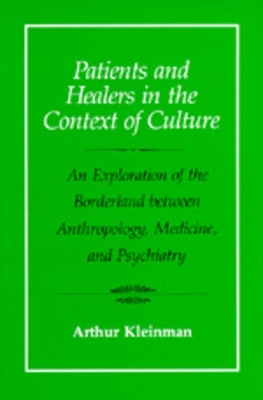Comparative Studies of Health Systems and Medical Care
2 primary works
Book 5
From the Preface, by Arthur Kleinman:Patients and Healers in the Context of Culture presents a theoretical framework for studying the relationship between medicine, psychiatry, and culture. That framework is principally illustrated by materials gathered in field research in Taiwan and, to a lesser extent, from materials gathered in similar research in Boston. The reader will find this book contains a dialectical tension between two reciprocally related orientations: it is both a cross-cultural (largely anthropological) perspective on the essential components of clinical care and a clinical perspective on anthropological studies of medicine and psychiatry. That dialectic is embodied in my own academic training and professional life, so that this book is a personal statement. I am a psychiatrist trained in anthropology. I have worked in library, field, and clinic on problems concerning medicine and psychiatry in Chinese culture. I teach cross-cultural psychiatry and medical anthropology, but I also practice and teach consultation psychiatry and take a clinical approach to my major cross-cultural teaching and research involvements.
The theoretical framework elaborated in this book has been applied to all of those areas; in turn, they are used to illustrate the theory. Both the theory and its application embody the same dialectic. The purpose of this book is to advance both poles of that dialectic: to demonstrate the critical role of social science (especially anthropology and cross-cultural studies) in clinical medicine and psychiatry and to encourage study of clinical problems by anthropologists and other investigators involved in cross-cultural research.
The theoretical framework elaborated in this book has been applied to all of those areas; in turn, they are used to illustrate the theory. Both the theory and its application embody the same dialectic. The purpose of this book is to advance both poles of that dialectic: to demonstrate the critical role of social science (especially anthropology and cross-cultural studies) in clinical medicine and psychiatry and to encourage study of clinical problems by anthropologists and other investigators involved in cross-cultural research.
Book 31
Pain as Human Experience
by Mary-Jo DelVecchio Good, Paul E. Brodwin, J. Byron Good, and Arthur Kleinman
Published 1 January 1992
Chronic pain challenges the central tenet of biomedicine: that objective knowledge of the human body and mind is possible apart from subjective experience and social context. Sufferers, finding that chronic pain alters every aspect of life, often become frustrated and distrust a profession seemingly unable to explain or effectively treat their illness. The authors of this volume offer an entirely different, ethnographic approach, searching out more effective ways to describe and analyze the human context of pain. How can we analyze a mode of experience that appears to the pain sufferers as an unmeditiated fact of the body and is yet so resistant to language? With case studies drawn from anthropological investigations of chronic pain sufferers and pain clinics in the northeastern United States, the authors explore the great divide between the culturally shaped language of suffering and the traditional language of medical and psychological theorizing.
They argue that the representation of experience in local social worlds is a central challenge to the human sciences and to ethnographic writing, and that meeting that challenge is also crucial to the refiguring of pain in medical discourse and health policy debates.
They argue that the representation of experience in local social worlds is a central challenge to the human sciences and to ethnographic writing, and that meeting that challenge is also crucial to the refiguring of pain in medical discourse and health policy debates.

